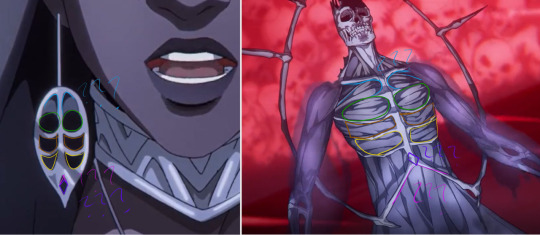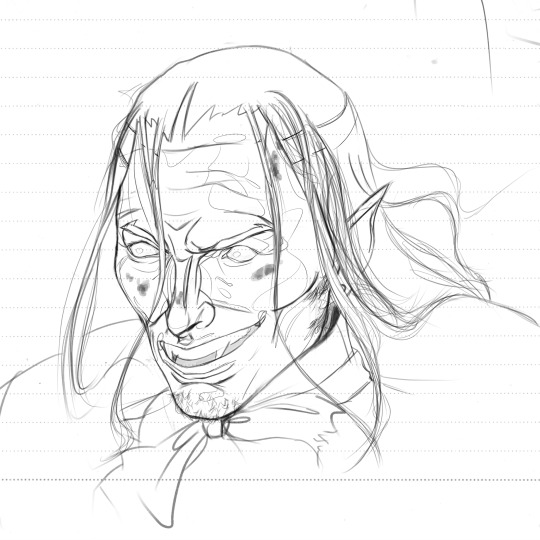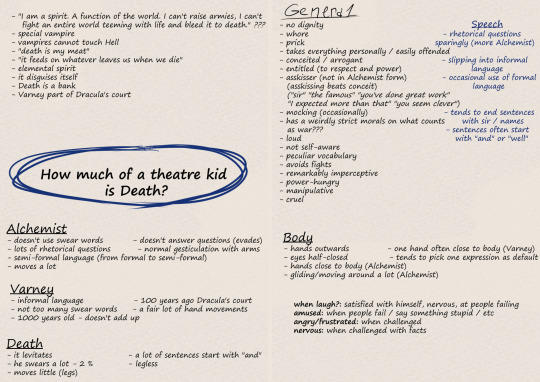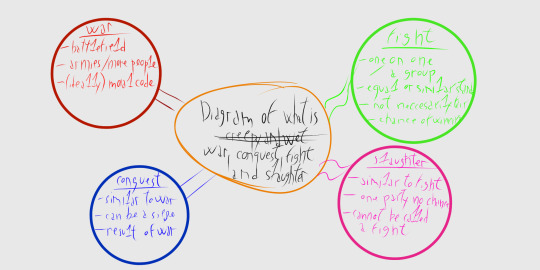-and is really weird about it - 21 - I don't bite real people but I do break the bones of fictional ones. Metaphorically. With a sledgehammer. A metaphorical one. - I have very strong opinions about the fall of Icarus and its unfair treatment in pop culture. Ask me about the fall of BellerophonIf you are interested in my art, here is my carrd:L.I.E.
Last active 60 minutes ago
Don't wanna be here? Send us removal request.
Text
Castlevania’s Death aka Oh God I Am Reaching: A character analysis
Preface: You may have seen this already a few years back. This is because I did in fact post this a few years back. However, that blog of mine is gone, so I am reposting it anew. I removed some fluff past me put in and I believe i should make sense without it, but please do shout if it does not and I will attempt to fix my mistakes. Thank you in advance.
Contents
A few useless fun facts
The sauce Core question Evidence Traits evidence Conclusion Traits and speech but wrapped in sauce (check „Hard“ data, „General“ section, for TLDR)
„Hard“ data (aka just a list of everything The Sauce covers. Think of the actual statistics in a research. The paper tells you about them in complex senteces but then provides you with the numbers.)
My personal shitty little observations
To make things easier, when referring to Death as a whole, I’ll be saying just Death. When referring specifically to the true form of Death, I’ll be saying „Death (true form).“
The Sauce (and my fruitless attempts at maintaining a coherent chain of thought)
Without further ado! Ladies, gentlemen, creatures of other titles and/or genders, I have asked myself the age-old question, my friends have asked themselves the age-old question: Is Death a theatre kid? Now, I come to you, bearing what you may choose to accept as an answer, or throw it out and beat me up behind an Albert.
I’d like to clarify that I employed both meta and in-universe thinking, but threw out chunks of meta thinking A) for convenience’s sake (depite my core principle never to give any author more potential credit than they are due) B) because my friend looked like they were about to beat me with a stick if I once more said the phrase „But this is probably just a mistake on the writers’ part and should be ignored.“ I will mention where I did this so you can decide for yourself if you desire to make a potential reach or discard it.
Core question
So, to start off bluntly: Is Death a theatre kid (and to what extent)? Lol. Lmao. No. Never (okay, that’s a lie). To elaborate: Death is not a theatre kid unless it is absolutely needed and even then he sucks at it.
What I am saying is that the disguises are both most likely manufactured by Death, and even if they aren’t, Death does not assume a role, or, in the case of The Alchemist, does not do it well.
„That is a bold statement, where is the evidence?“ I am glad you ask. Let us continue to:
The Evidence
Our first problem was the oddly common misconception that Death can only shapeshift into existing beings, even more specifically dead beings. Since this was a prevalent thought in our group, I am addressing it. It is, in fact, not even implied anywhere in canon. To be extra sure, I tried cross-referencing the game canon even though it is a completely different universe. Some aspects remain similar in those two universes after all. While the character of Death works a little different (and if the wiki is to be trusted it is unclear if game Death is supposed to be a Shinigami or the wester concept of Grim Reaper), the abilities seem to be the same, however, while there is an example of game Death shapeshifting, the wiki did not address nor specify whether or not the disguise (Zead) existed as a pre-established person before game Death took his form. If this is addressed in the games, I would like to know. With no further information, we decided that our common opinion was simply a bias most likely caused simply by the word „death.“ (and in one acquaintance’s case by DnD).
With that thrown out, we took a look at the designs of the disguises. This is where I am reaching and throwing out meta. If you wish to silence my tongue and accept meta as your god, that is completely understandable. As we all know, designs have both out of universe and in-universe implications. A design should convey a character’s role. However, this sometimes produces unintended implications in-universe (for example the ever classic question in JRPGs and anime: Who would wear bikini armour into battle?). Varney’s design is not really remarkable in this regard, its coat does have a scythe-like collar (as is stated to be intended in the art book), however, this could well enough be a coincidence in-universe. The odder one out of the bunch is The Alchemist. While the early designs in the art book have remarkably little to do with what most conceptualise as death (with the exception of the ever-present cape), the final design looks like what the average person might draw if you tell them to draw death – the colour scheme is cold, only brightened by the light blue, which could be considered a cold colour, it includes a cape reminiscent of the one the Grim Reaper is traditionally depicted wearing, and the gown is similar to the robe death tends to be depicted in as well. Out of universe, this makes complete sense, in-universe, it is a little odd but nothing major. Who’s to say that there couldn’t have been a random woman who looked like that? The thing that seals it for me in universe are her earrings. While the animators seemed to have taken some liberties with every frame, the general pattern actually mimics the patterns of Death’s (true form) rib cage. Again, out of universe? A normal design choice, a pretty cool one at that. In universe? Now where would you get a woman who has such earrings? Of course, there is also the possibility that Death can simply alter parts of the disguises. The mental image of Death adding specifically rib cage-patterned earrings is a hilarious one ngl.

Before we get to the next points, it is import to note that, as I mentioned, Death seems to have no interest in acting out a role and isn’t even good at it when he is. When posing as The Alchemist, the speech pattern is noticeably different (no swear words, more formal language in general), however, it very quickly starts shifting towards shortened verbs, and starts being formal again after a pause. Then it devolves into shortened verbs again. Varney and Death (true form) have a pretty much identical speech pattern, the only difference is that Death (true form) has a higher swear word percentage, but that may be due to the prevalence of pissed off scenes. All forms also pronounce words the same way (a fun tidbit that is not really meaningful is that The Alchemist never say can’t, only cannot). To add to that, Varney and Death (true form) sometimes speak in the exact same tone of voice as the other form. Out of universe, the usage of the same VA for Death (true form) and Varney might be some kind of indication as well („Oh dear author, that was most likely for budget reasons!“ Okay well I don’t see how that’s my problem.)
Now we can talk about a question that is related to this issue: Let’s say the disguises are pre-established people. Why would Death pick Varney as a disguise? There were, in general, two ideas. One mine and one was proposed by a guy on Discord, whom I thank for an outside perspective. He proposed that he may have been chosen because Death knew nobody knew him and as such could do fuck-all undetected. Although that makes sense, we must consider that Death repeatedly appears to be weirded out by the fact that nobody knows Varney, even in situations where acting in character (if Death even cared about acting in character in the first place, and he does not) is not necessary, which leads me to believe that Death genuinely didn’t expect that. Which is where my opinion comes into play. I believe that in this proposed scenario, Death would have chosen Varney as a disguise because he knew (or assumed) that Saint Germain knew who Varney was. Both this and the apparent expectation of Varney being known make me think that if this were the case, Death would have attempted to act in character as not to arouse suspicion. He, however, doesn’t act any different, not in general and not in front of people who were supposed to know Varney, and Saint Germain doesn’t get suspicious, implying that Death’s behaviour and mannerisms align with whatever Saint Germain knows about Varney (it is fair to note, however, that Saint Germain at this point probably wouldn’t notice even a brick flying straight at his face, so perhaps this is not the most reliable source.)
To add to that: I have noticed that the dates given by the show do not add up. What I will now be describing is another reach that is most easily explained by a simple mistake or lack of care for precision. If you desire to to disregard it, you may do so, however, I am bound by my friends’ annoyance at my too out-of-universe thinking and I must consider it as not to test their wrath. At this point, Castlevania takes place when? 1497? Saint Germain and maybe one more person (unsure, 100% certain only about Saint Germain) remark that Varney is 1000 years old. I do trust Saint Germain on this and take it as factual. When Varney gets annoyed that nobody knows him for like the third time, he asserts that he was mighty when London was a Roman ghost town. Except that London wouldn’t have been a Roman ghost town by the time Varney came into existence. Now, I did not have internet when I was making all my notes, but a source on the phone double checked the date when Romans definitely left London for me, because I had a feeling it was off but wasn’t sure due to the repeated migrations in and out of London. IF she is correct, the dates just don’t add up. If I bend to the will of my friend group, this effectively means that Death outed himself as not Varney, or at least admitted to being older than Varney should be. Might also imply that Death was in Londinium. What this says is that he definitely doesn’t care to be in character to the point of just straight up saying something that would immediately make anyone who knows history really suspicious. He says more things that could be taken as suspicious but not so much as this one, as the other lines could very well be interpreted metaphorically by everyone around („-you do not know what I am, but I tolerate you precisely because you’re good at death – it nourishes me.“) and some things that seem to align exclusively with Death’s (true form) goals and likely wouldn’t align with the average vampire mindset („He owes us death. Death in volumes unprecedented.“)
Now that we are past that: If Death doesn’t care about being in character and just does whatever unless it’s absolutely required for him to attempt to assume a role, why does he keep getting so weirdly offended when people don’t know Varney? Why does he keep asserting who his disguise is? I am of the opinion that a situation like that might happen only when you have a disguise for such a long time that it basically becomes you in a sense or when there was never a pre-established person in the first place.
And we arrive at one of my last points, this one ties in nicely with the first one. I, once again, cross-referenced the games’ canon because there was one thing that slightly confused me: During the 9th(?) episode, Trevor refers to Death (true form) exclusively as „it,“ but uses „he“ when remarking that Varney was likely a part of Dracula’s court. If taken as objective, this would draw a distinction between Varney and Death (true form). Plus the show says that Varney joined Dracula’s court one hundred years ago. I am unsure how reliable this piece of information is but considering that Varney does say that he’s of Dracula’s original cohort, I’ll believe it. Due to all of this, I wasn’t sure if I should be of the opinion that Death has been going around in this disguise for at least 100 years or if Varney himself was the one to join Dracula’s court. I decided to assume that the writers meant Death to be, in certain aspects, similar to the game’s canon (a factor in this decision was once again the uncertainty if game Death is the Grim Reaper or a Shinigami. A Shinigami could, in the realm of medieval fantasy that takes its artistic liberties, especially if it’s one made by someone with certain opinions, technically be described as an elemental spirit. Consdering that, one could argue that the Deaths are meant to be similar in at lest some aspects.). When I allowed myself to take this liberty, I then proceeded to take into account the fact that the game’s Death is second in command to Dracula and that it has been for quite some time. After doing so, I came to the conclusion that if the disguises were pre-established people, Death (true form) had to have been moonlighting as Varney for over 100 years, which would fall in line with the previous paragraph.
To take a break and enrich your reading experience, have a picture of the local ZOO’s echidna:

Traits Evidence
Let us move on to the even more subjective and questionable area: traits, speech patterns, movements.
The general traits of all forms are seemingly the same. All three forms are quick to take everything personally when questioned, are conceited, manipulative, arrogant and, in general, they’re pricks. All three use rhetorical questions (though The Alchemist uses them the most), and all three use similar hand gesticulation (specifically they orient their hand movements outwards. In other hand movement regards, there are some differences: The Alchemist moves both arms/hands outwards or keeps them both by her body; Varney usually has one hand by his body and the other oriented outwards, Death (true form) usually has both arms outwards). All three forms gravitate towards semi-formal language, using shortened forms of words with the occasional use of full forms (The Alchemist is a bit of an outlier in that, as mentioned, she starts with formal language and descends into a semi-formal one). All three forms also tend to start sentences with „and,“ with both Death (true form) and Varney using „well“ to start sentences as well. They all tend to end sentences with either the name + surname of the person they’re talking to, or their name + title, or „sir.“
There seems to be basically no line between Death (true form) and Varney. Obviously a lot of these things rely on the accuracy of general information provided by other characters though, as I am at the mercy of nothing if not accuracy. In addition to the common traits of all three forms, Death (true form) and Varney are both also entitled, power-hungry, often, they take a mocking tone and are loud even when it would be better to shut up. They are both cruel and have a peculiar vocabulary.
Varney and The Alchemist both also use the phrase „[somebody’s] Great Work,“ which would not be odd in my opinion if it was used for the same construct, as it might simply be the correct term for it, however, it is used in a different context each time.
(Author's 2024 note: Have a simple old as balls Varney doodle in these trying blocks of text)

Conclusion
All of this leads me to believe that The Alchemist and Varney are either forms fully made up by Death, or they are pre-established but Death has been disguising as Varney for a damn long time now. I personally do not think that either of those options is the more likely one, however, if you are of a diferent opinion, I would like to hear it. Personally, I choose to go with the first option, simply because I find the mental image of Death just making up a guy some 1000 years ago, the way you’d create some kind of -sona, incredibly hilarious.
Traits and speech but wrapped in sauce
After reaching this conclusion and choosing the option to go with, it came to the part that actually wasn’t originally planned but considering I got this far, I decided I might as well do it. It was time for using all three forms to determine the exact speech patterns (I actually don’t know why I did that. I think it’s a reflex because I usually only analyse a character when I need to write them, and when I wirte them, I obviously need o understand how they talk, preferably as perfectly as possible lest I commit the heresy of being out of character and then die out of shame), traits, and peculiar tidbits.
When he talks, Death seems to sometimes use rhetorical questions, the Alchemist form uses them the most but they are sparingly used elsewhere as well. When it comes to opening a sentence, there is a pattern of starting sentences with the words „and“ or „well,“ as I mentioned earlier. It is not too often that this happens but it isn’t rare enough for me not to write it down. When ending a sentence, a lot of the time, Death ends it with the name of the person he’s talking to, or with „sir.“ I found this a little unusual because, at least in my experience, that is not what people do when talking to someone 1 on 1. There is only one example of this, so take it with an even bigger grain of salt than the rest of this, but it also appears that when Death is angry, he starts putting the name in the middle of the sentence instead. Not sure why anyone would need to know this but like idk I feel like if I would need this if I weren’t me. Death also talks in an informal way most of the time, occasionally employing a more formal vocabulary. Interestingly enough, none of the forms actually ever use anything that I would consider to be an advanced word, making it entirely possible that Death wasn’t messing with Saint Germain when he (as Varney) told him that he was looking for a really big word but couldn’t find one. Which is useless but it’s funny. This is not mentioned in the “Hard” Data because I have it noted down in the line transcriptions in the form of various forms of underlining, but Varney specifically tends to stretch some words out, I can’t really describe it (author's 2024 note: I believe that what past me was attempting to describe was simply a British accent. I have analysed a lot of Brits since this analysis and am pretty confident that that is just how a lot of them talk). Instead of fair it’s more like faaaair, or instead of word, sometimes it sounds more like wrrrrrd. Useless as well but part of analysis nonetheless.
When it comes to the body, as I already said, all forms tend to make a fair share of hand and arm movements that are oriented outwards, with The Alchemist having her arms right by her body the majority of the time and emplyoing both of her arms and hands in those outwards oriented motions. Varney gesticulates a lot more than The Alchemist, however, he usually does so with one hand, the other tends to be by the body. Death (true form) nearly always holds both of his arms/hands in an outwards oriented gesture. The forms with eyes also appear not to have their eyes fully open, though I admit it is hard to tell in the case of The Alchemist if her eyes are just like that or if they are half closed.
Next, the emotional expressions. Death doesn’t really laugh/chuckle/etc whenever he is amused, instead, he seemingly does it when he is satisfied with himself, when he is nervous, or when someone does something he himself considers to be a fail of sorts. His amusement is more general: He seems amused whenever anyone says something seemingly stupid or nonsensical, when someone fails at something,… In general, he’s amused whenever your idea of a typical malicious person would be. He gets frustrated when he is challenged or questioned in any way, often appealing to his authority as a retort. However, when the person questioning him backs their words up with facts, he gets nervous instead.
I will leave the traits in the “Hard” data as I have no sauce to say about them. No, I will not elaborate on bulletpoint #2.
“Hard” Data
This is basically just a transcription of everything on the physical papers used for our notes, minus all the character lines transcriptions, which greatly reduces the numbers because most of those pages are just line transcriptions. I originally wanted to just scan the notes but I don’t think anyone could read my writing. Some of it is incomprehensible, especially because at the start we couldn’t really agree on what exactly certain things meant, as we just noted them down as they were to remember.
Small note: The notes make a distinction between a fight, conquest, war, and slaughter. This is further elaborated upon in „My personal shitty little observations"

My personal shitty little observations
1. Observation: There is a substantial difference between several types of „combat.“ There is war, then there is conquest, then there is battle/fight and then there is slaughter. To define what I mean, war is, ideally, a fair battle on a battlefield conducted under a moral code. Conquest is sometimes a consequence of war or planned when a war starts. It should also be conducted under a moral code. Both are mass battles. A fight is a, usually, one on one hands throwing. Or knife throwing. Or anything. A fight does not need to be fair but for it to be a fight, either party needs to have a chance at winning. Otherwise it’s just slaughter. Slaughter is a farmer culls a goat. Slaughter is when one party has practically no chance of winning, so much so that it cannot be called a fight anymore.
Death, for one reason or another, does not participate in a fight, any kind of fight, even when he has a high chance of winning. Death participates only when it’s slaughter, or at least when it appears to be a slaughter to him. Him and Ratko set a trap for Zamfir, when they could have likely demolished her and that one guard themselves. In the argument with Ratko, he mentions that he could easily obliterate him where he stands, yet he avoids any kind of confrontation even when it looks like Ratko might just resort to a good old hand-throwing (he says that he tolerates him because he’s good at death, which is understandable, but it’s odd that he doesn’t reiterate even when it comes close to blows.) When in the underground, Varney uses stealth to avoid a human guard, even though it would probably take the exact same amount of effort to one-show him in a way. He only murders an unarmed civilian and fights Trevor in his true form. That leads me to believe he only „fights“ when he considers the other party absolutely incapable of winning. I am not drawing any conclusion from this, I’m just saying. Draw whatever you want from that.

(nearly unreadable diagram to give you a break from the walls of text)
2. Observation: I find it absolutely hilarious that a character who is an inhuman being technically totally removed from humanity since its inception, probably closer to something like a rusalka or hejkal than a man, is ironically incredibly human in its traits and motivations.I mean, what are some traits beings like hejkal, rusalka or anything like that usually have? They tend to be more or less emotionless, soulless, cold but not in a mean way, they’re cold the way a stone is cold, impersonally, indifferently. They toy with humans but not to achieve anything, but the way a cat toys with a mouse, the way a kid toys with ants. These beings just…exist with nearly no emotions whatsoever, on a higher level, no anger or hatred or disgust. Would you be disgusted by an ant? In most depictions, they don’t even have the capacity. That makes them inhuman.
But he does behave in a typically human way., and is clearly not aware of this as he does attempt to separate concepts like need or greed from his existence by labeling them as “human.” He doesn’t label greed as just that, simply greed, a general concept anyone can experience, he labels greed as human. True, inhuman creatures in folklore and mythos usually do not experience greed, the exception to this rule being creatures like the gods of polytheistic cultures. Greek, Egyptian and Norse gods are, however, generally agreed to be pretty human. Ancient gods squabbled like humans, loved like humans, fought wars like humans. Which is where it comes back to showing very human behaviour. We have labeled greed as a human trait and we have established that ancient gods were, in a way, very human despite their higher standing (Most of them owned it though). Death does, in fact, experience this “human” greed and to a fairly big extent. Depending on the definition of experiencing need, one might also conclude that the character does experience need. Constructs do not experience need as is currently defined (the awareness of a lack/deficiency with the intention of changing that), I mean, fairies, rusalky, they just wait, they do their “job” and nothing more, nothing less, they don’t actively try to do anything about it.
It can also be safely said that Death does experience anger, frustration, disgust, amusement (possibly an inhuman emotion if treated as malice considering most inhuman creatures do in fact experience malice, although not personal malice, again, it’s the malice a child feels when emotionally torturing ants. Whether this character experiences personal or impersonal malice is unclear to me personally and I would have to consult this with my co-insane person and adopt their opinion as my own, for I have none on this matter), shock (do fairies feel shock? Do they give a shit if something unexpected happens? Is shock a human emotion?), nervousness, conceit (is that an emotion? I don’t know how to say that specific emotion when someone’s arrogance gets hurt, I know it IS a specific emotional state, I just don’t know what it’s called. Like when someone tells your grandpa that he’s wrong about something and he’s just super miffed about it the whole day and keeps trying to argue about it. I’m sure that’s a very specific emotion.), etc. Those are human emotions. Death, who should, in theory, be above the needless human squabbles and things, is very VERY human in behaviour, much like the gods of Ancient Greece. Which isn’t really odd or anything, I just think it’s interesting because the character himself separates himself from humanity and should be separate from it in theory. But he very much…isn’t. He thinks he’s on a high horse but he’s actually bonking people with a stick in the middle of a mud puddle like the rest of the polite society.
#castlevania#netflix castlevania#castlevania netflix#castlevania death#castlevania varney#varney castlevania#varney#i love when a tag is just me and me. funny every time and it just keeps happening. end my suffering.#anyway listen to me. i am older and wiser now and for one i need to rewrite this but mainly i want to say that i have since acquired like#3 more guys with the 'haha inhuman creature is more human than many humans' thing going on and i gotta say it slays every time#easily a great theme
9 notes
·
View notes
Text
INFO
Hello! This is my analysis blog. Despite character analysis being a huge hobby of mine, it is very well possible that this will be my least active blog as I have, uh, more hobbies than wits and they might eat my time. I will attempt to keep this relatively active and do one analysis a month at least, but if you are interested in fan/art and fan/fiction or modding stuff, here are my other blogs that will likely be a bit more active:
@featherymuffins-moi - blog dedicated to my BG3 modding. Here I post pictures of my mods and my WIP mods and sometimes talk about BG3 (overlapping territory with my writing+art blog)
@light-wrath-art - blog dedicated to my art and writing, both fanart and fics and original art + original prose and poetry and all things related (might include me randomly rambling about writing)
0 notes